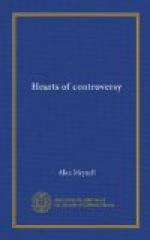CHARLOTTE AND EMILY BRONTE
The controversy here is with those who admire Charlotte Bronte throughout her career. She altered greatly. She did, in fact, inherit a manner of English that had been strained beyond restoration, fatigued beyond recovery, by the “corrupt following” of Gibbon; and there was within her a sense of propriety that caused her to conform. Straitened and serious elder daughter of her time, she kept the house of literature. She practised those verbs, to evince, to reside, to intimate, to peruse. She wrote “communicating instruction” for teaching; “an extensive and eligible connexion”; “a small competency”; “an establishment on the Continent”; “It operated as a barrier to further intercourse”; and of a child (with a singular unfitness with childhood) “For the toys he possesses he seems to have contracted a partiality amounting to affection.” I have been already reproached for a word on Gibbon written by way of parenthesis in the course of an appreciation of some other author. Let me, therefore, repeat that I am writing of the corrupt following of that apostle and not of his own style. Gibbon’s grammar is frequently weak, but the corrupt followers have something worse than poor grammar. Gibbon set the fashion of “the latter” and “the former.” Our literature was for at least half a century strewn with the wreckage of Gibbon. “After suppressing a competitor who had assumed the purple at Mentz, he refused to gratify his troops with the plunder of the rebellious city,” writes the great historian. When Mr. Micawber confesses “gratifying emotions of no common description” he conforms to a lofty and a distant Gibbon. So does Mr. Pecksniff when he says of the copper-founder’s daughter that she “has shed a vision on my path refulgent in its nature.” And when an author, in a work on “The Divine Comedy,” recently told us that Paolo and Francesca were to receive from Dante “such alleviation as circumstances would allow,” that also is a shattered, a waste Gibbon, a waif of Gibbon. For Johnson less than Gibbon inflated the English our fathers inherited; because Johnson did not habitually or often use imagery, whereas Gibbon did use habitual imagery, and such use is what deprives a language of elasticity, and leaves it either rigid or languid, oftener languid. Encumbered by this drift and refuse of English, Charlotte Bronte yet achieved the miracle of her vocabulary. It is less wonderful that she should have appeared out of such a parsonage than that she should have arisen out of such a language.




